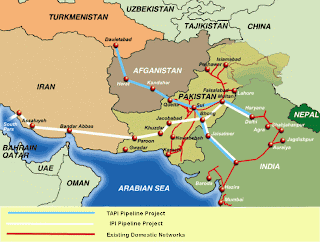Turkmengaz, the Turkmenistan state-owned corporation responsible for building the TAPI (Turkmenistan-Afghanistan-Pakistan-India) natural gas pipeline, held a series of meetings in September 2012 with potential investors in Singapore, New York and London. Sakhatmurad Mamedov, the company CEO, announced the project had been "successfully put forward." At least one oil company, Shell, has begun to review the project, according to Indian sources. Other companies who have attended the meetings includeCitigroup, Morgan Stanley, Deutsche Bank, Macquarie Bank, and the US Export Import Bank.
Mamedov believes that TAPI will lead to stability throughout Central Asia. "The realization of the TAPI project will give an impulse to the development of the countries taking part in the project and will also strengthen stability in the region as well as creating new jobs," he said.
Mamedov's optimism is supported by the United States. At a conference held in Ashgabat in November, Deputy Assistant Secretary of State for South and Central Asian Affairs, Lynne Tracy, stated Washington welcomed the progress made on the pipeline. "The road ahead is long for this projects, but the benefits could be significant and are certainly worthy of the diligence demonstrated by these four countries so far," she said.
Such positive developments has convinced at least one additional country to express interest in joining TAPI, Bangladesh; but no official request has been made, according to Turkmenistan's acting Minister of Oil and Gas Industry and Mineral Resources, Kakageldy Abdullaev. "There is a request from Bangladesh to join the project," he reported. "We require official note, which will be considered by all four governments."
Beside the obvious security problem of running a pipeline through war-torn Afghanistan, however, the proposed pipeline continues to face difficulties. According to an unnamed Indian oil ministry official, global pipeline companies do not want to invest in the project until Turkmenistan changes its rules and allows the companies to buy into the country's onshore oil and gas fields. According to Pakistan's Minister of Petroleum and Natural Resources, Asim Hussain, Turkmenistan is meeting the demands. "Turkmenistan has now agreed to have some form of agreement in the upstream side." This observation was not confirmed, however, by Turkmenistan's Minister of Oil, Kakageldi Babdulayev, who confined his comments to describing discussions as an "ongoing process."
Another difficulty is that the regional energy superpower, Russia, does not support the construction of TAPI. According to unnamed European diplomats, Russia cannot conceive of a project that lead to gas export to regions other than to its main market, Europe. As a result, Moscow has not backed TAPI, which the Europeans characterized as a US proposal to check Russian intentions.
Mamedov believes that TAPI will lead to stability throughout Central Asia. "The realization of the TAPI project will give an impulse to the development of the countries taking part in the project and will also strengthen stability in the region as well as creating new jobs," he said.
Mamedov's optimism is supported by the United States. At a conference held in Ashgabat in November, Deputy Assistant Secretary of State for South and Central Asian Affairs, Lynne Tracy, stated Washington welcomed the progress made on the pipeline. "The road ahead is long for this projects, but the benefits could be significant and are certainly worthy of the diligence demonstrated by these four countries so far," she said.
Such positive developments has convinced at least one additional country to express interest in joining TAPI, Bangladesh; but no official request has been made, according to Turkmenistan's acting Minister of Oil and Gas Industry and Mineral Resources, Kakageldy Abdullaev. "There is a request from Bangladesh to join the project," he reported. "We require official note, which will be considered by all four governments."
Beside the obvious security problem of running a pipeline through war-torn Afghanistan, however, the proposed pipeline continues to face difficulties. According to an unnamed Indian oil ministry official, global pipeline companies do not want to invest in the project until Turkmenistan changes its rules and allows the companies to buy into the country's onshore oil and gas fields. According to Pakistan's Minister of Petroleum and Natural Resources, Asim Hussain, Turkmenistan is meeting the demands. "Turkmenistan has now agreed to have some form of agreement in the upstream side." This observation was not confirmed, however, by Turkmenistan's Minister of Oil, Kakageldi Babdulayev, who confined his comments to describing discussions as an "ongoing process."
Another difficulty is that the regional energy superpower, Russia, does not support the construction of TAPI. According to unnamed European diplomats, Russia cannot conceive of a project that lead to gas export to regions other than to its main market, Europe. As a result, Moscow has not backed TAPI, which the Europeans characterized as a US proposal to check Russian intentions.



















